 Petzlover
Petzlover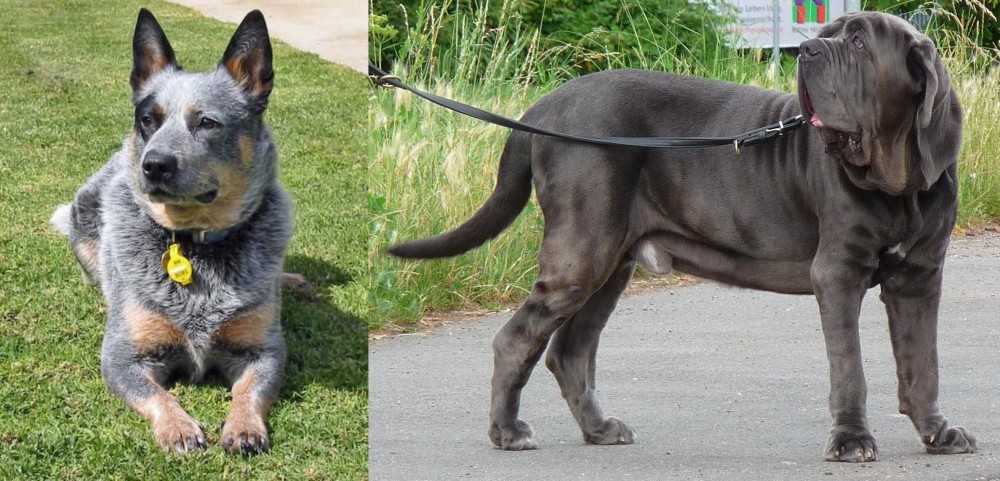 Queensland Heeler is originated from Australia but Neapolitan Mastiff is originated from Italy. Queensland Heeler may grow 19 cm / 7 inches shorter than Neapolitan Mastiff. Queensland Heeler may weigh 57 kg / 125 pounds lesser than Neapolitan Mastiff. Queensland Heeler may live 6 years more than Neapolitan Mastiff. Queensland Heeler may have less litter size than Neapolitan Mastiff. Queensland Heeler requires Low Maintenance. But Neapolitan Mastiff requires Moderate Maintenance
Queensland Heeler is originated from Australia but Neapolitan Mastiff is originated from Italy. Queensland Heeler may grow 19 cm / 7 inches shorter than Neapolitan Mastiff. Queensland Heeler may weigh 57 kg / 125 pounds lesser than Neapolitan Mastiff. Queensland Heeler may live 6 years more than Neapolitan Mastiff. Queensland Heeler may have less litter size than Neapolitan Mastiff. Queensland Heeler requires Low Maintenance. But Neapolitan Mastiff requires Moderate Maintenance
 Another name for Queensland Heeler is Australian Cattle Dog or Blue Heeler.
Another name for Queensland Heeler is Australian Cattle Dog or Blue Heeler.
These dogs have always been known for herding cattle. The term ‘Heeler’ comes from the dog’s working style – nipping and biting at the cattle’s hooves.
He was was an Australian cattle dog for Australian settlers in the 1800s. It is believed that Thomas Hall created one of the foundations of the Australian Cattle Dog breed by crossing crossing sheepdogs with Dingos.
The Blue-colored dogs have been the most popular, being known as the Blue Heeler.
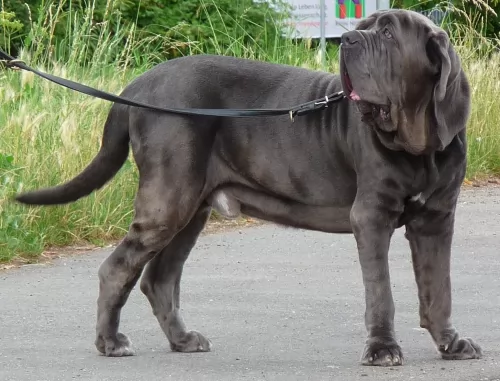 An ancient breed, the Neapolitan Mastiffs are massive dogs with a history of protecting their family and their property. The breed has deep rooted protective instincts and they are very frightening in appearance. The Neapolitan is of the Molosser group of dogs, all of whom probably came from the same line. It is known that all the mastiffs in Europe are descendants of the Tibetan Mastiff. The Tibetan Mastiff is considered the most ancient of all canines.
An ancient breed, the Neapolitan Mastiffs are massive dogs with a history of protecting their family and their property. The breed has deep rooted protective instincts and they are very frightening in appearance. The Neapolitan is of the Molosser group of dogs, all of whom probably came from the same line. It is known that all the mastiffs in Europe are descendants of the Tibetan Mastiff. The Tibetan Mastiff is considered the most ancient of all canines.
The Asian Mastiffs came from India to Greece around 300 BC with Alexander the Great. Then the breed was brought to the Romans by the Greeks and then introduced them in their circus in fights. Another possibility is that around 500 BC the mastiffs came to Britain from the Phoenicians. Either way the Roman Molossus is the ancestor of the Neapolitan Mastiff.
The Romans crossed the breed with the English Mastiff around 55 BC and developed a premiere war dog that was called a Mastini.
The breed eventually became extinct in Europe with the exception of Campania. The breed was recognized in 1946 with the standard accepted in 1949. However, it is believed that the Neapolitan Mastiff has been continuously present in Campania for over two thousand years. The breed was initially developed as war dogs and for the Roman coliseum spectacles.
In 1946 Dr. Piero Scanziani established a program to breed them in Italy. He wrote the breed standard in 1949.
Today the Neo is a farm dog, an army dog, a police dog and a guard dog. They were shown in Italy for the first time in 1946 but only in 2004 was the breed recognized by the American Kennel Club (AKC). It was 1973 when the Neapolitan Mastiff Club of America was born and 1996 when the standard was approved by the AKC. They are still a rare breed in the United States.
 The Queensland Heeler is a medium sized dog that stands between 43 and 51cm in height, both male and female. The dog weighs in the region of 15 to 22kg.
The Queensland Heeler is a medium sized dog that stands between 43 and 51cm in height, both male and female. The dog weighs in the region of 15 to 22kg.
He has a short double coat with colors being blue, mottled blue and also red speckled. You’ll also find black and tan coloring on this active dog.
He is strong, lean and muscular with medium sized ears that are erect. The eyes are dark and alert, the legs straight and strong. The tail can be docked or left long.
The Australian Cattle Dog is a high-energy working dog that you won’t easily find lying around. The alert eyes are consistently looking around for action and he can’t be bored otherwise he could resort to digging or other destructive behavior.
He is loving to his entire human family, but being particularly attached to just one family member. He is also protective, taking his guarding role of his family seriously.
He gets on well with children and other pets but you’ve just got to keep your eyes on him around children as when excited he can give a nip or two.
Training and socialization will be important for this dog, particularly because he can be strong-headed, willful and stubborn.
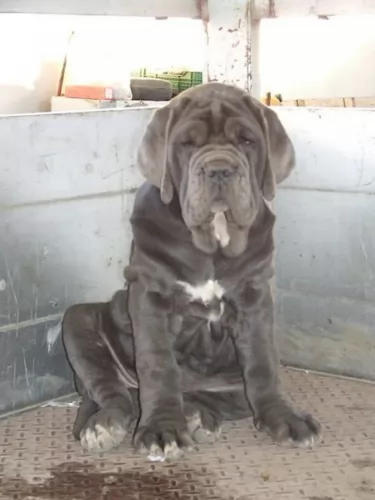 The Neapolitan Mastiff is a massive dog , so powerful and very intimidating in his looks. With an incredibly large head and hanging folds and wrinkles, the Neo is an impressive animal. His inner nobility and dignity is evident in his stance and the way he holds himself. He is relaxed, calm, quiet yet imposing none the less. His coat is dark whether black, tawny, gray or mahogany. He is muscular beyond imagination. The Neo is 10-15% longer than he is tall.
The Neapolitan Mastiff is a massive dog , so powerful and very intimidating in his looks. With an incredibly large head and hanging folds and wrinkles, the Neo is an impressive animal. His inner nobility and dignity is evident in his stance and the way he holds himself. He is relaxed, calm, quiet yet imposing none the less. His coat is dark whether black, tawny, gray or mahogany. He is muscular beyond imagination. The Neo is 10-15% longer than he is tall.
On his massive head his eyes are deep set and covered by his eye lids that droop. His eyes are blue as puppies then dark and coordinated with his coat. and his nose is large and the color of his coat. Ears are natural or can be cropped, and they carry their tail straight and curving back. The Neo has round paws and arched toes.
 Active, intelligent, feisty, brave, playful, loving – these are just some of the wonderful characteristics you get when you bring a Queensland Heeler into your home.
Active, intelligent, feisty, brave, playful, loving – these are just some of the wonderful characteristics you get when you bring a Queensland Heeler into your home.
True, he is independent, self-willed and stubborn, but training and socialization can take away all the rough edges.
He forms a strong bond with his human owner, and once you’ve had one of these amazing dogs in your life, you’ll be convinced that dogs are truly man’s best friend.
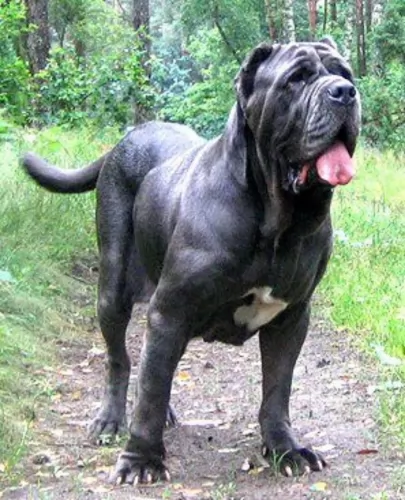 Older children in their family. No toddlers or strangers.
Older children in their family. No toddlers or strangers.
Protective yet quiet, calm, relaxed
No they won’t adapt well to apartment living or to strangers.
They are intelligent and trainable but must be socialized and know the human is the alpha or they will take over.
 Australian Cattle Dogs are healthy. Every dog, even the most healthiest breeds, can succumb to some of the common dog illnesses there are.
Australian Cattle Dogs are healthy. Every dog, even the most healthiest breeds, can succumb to some of the common dog illnesses there are.
This is an inherited condition, so if you’re looking for a puppy, be careful about the breeder you buy from.
This is another inherited condition where the thighbone of the dog doesn't fit properly into the hip joint. Your dog is usually so active but with this problem he may well be in pain and actually be lame. Your pet can even develop arthritis . The idea is to get your pet to the vet because it can be unbearable to see him in pain and unable to get around.
This eye disease can mean deterioration of the retina. You'll recognize the signs when you see your dog unable to navigate around your home during the night. He is night blind but later on he can’t see during the day either.
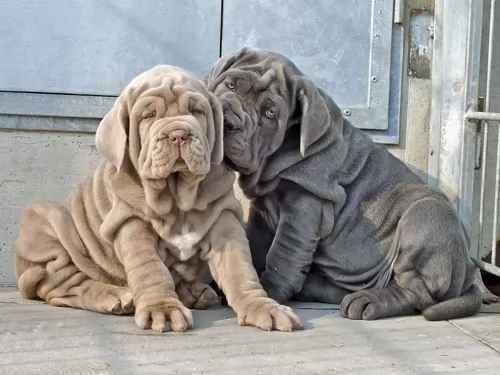 The Neapolitan Mastiff is prone to many of the same issues as any massive, extra large breed. The most common of these is Cherry Eye.
The Neapolitan Mastiff is prone to many of the same issues as any massive, extra large breed. The most common of these is Cherry Eye.
 To cope with his life on the Australian Outback, the Queensland Heeler is known to be a low maintenance dog.
To cope with his life on the Australian Outback, the Queensland Heeler is known to be a low maintenance dog.
The thick coat does shed and it can get dusty so a good brush twice a week is all that is basically required for this dog. If his nails don’t wear down naturally, you will need to have them trimmed. As with every dog, you will need to give attention to his ears and teeth.
This is an extremely active dog. He is going to be needing both mental and physical stimulation to avoid boredom, after all he is used to an active lifestyle herding cattle. Hikes, swimming, running – you name it – he’ll join you with all your activities.
Your Queensland Heeler is such a vibrant dog, full of the joys of living, and you want to ensure he has good food to eat to ensure he stays like that.
For convenience you get some excellent commercially manufactured dog foods. Your Blue Heeler is such a wonderful companion dog that you want to spoil him a bit and give him some delicious home-made food too. Boiled chicken, brown rice or pasta and spinach, sweet potatoes and carrots are a healthy choice for your pet – plain and simple just like dogs love it. Chop it up and add it into the high quality dry kibble a couple of times a week.
Some raw meat added in from time to time will help his skin and coat remain healthy. Never leave him without a constant source of fresh, cool water.
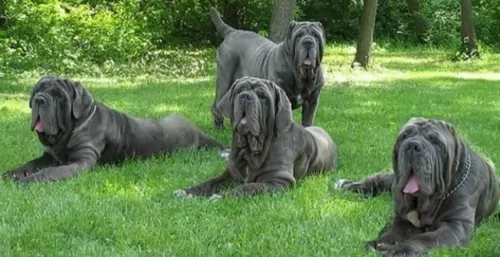 Neapolitans grow fast and so don’t overfeed when they are young. Lower protein and higher fat content.
Neapolitans grow fast and so don’t overfeed when they are young. Lower protein and higher fat content.
Don’t overfeed the adult as they can become obese.
This big hearty breed needs exercise but not too much. They overheat easily. The puppy will push himself, so you have to make sure he doesn’t over do it. No tug of war games. They need a long walk twice every day.